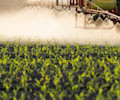$5 trillion global investor coalition (incl. Legal & General Investment Management (UK), Canada Post Corporation Pension Plan) urges governments to disclose specific targets for reducing agricultural emissions as part of Nationally Determined Contributions (NDCs) in the lead up to COP26.
Investor group is supported by Ban Ki-moon, architect of the 2015 Paris Agreement, joining the call for action on agriculture’s contribution to climate change.
FAIRR research finds no updated NDCs from G20 nations have clear national emissions reduction targets for the agricultural sector. By contrast, 50% of updated NDCs (of the G20) have targets for the energy sector.
_“_Governments have the opportunity to show leadership and be transparent about how much of their climate pledges will be ring-fenced as coming from agriculture. Capital markets need that data,__” says Jeremy Coller, Chair of the $38 trillion FAIRR investor network.
A global investor coalition and former UN Secretary-General Ban Ki-moon are calling on all G20 nations to disclose specific targets to reduce agricultural emissions within their Nationally Determined Contributions (NDCs) in the lead up to COP26 climate talks in November.
In the ‘Where’s the Beef’ statement, an initial $5 trillion group of investors coordinated by the FAIRR Initiative, urges G20 governments to be more transparent about how much of the emissions reductions planned in their NDCs will come from the agriculture sector. Ban Ki-moon has also signed the statement.
Agriculture currently accounts for a third of all global emissions. However, none of the G20’s currently released national climate commitments (NDCs) include clear national targets for emissions reductions in the agriculture sector. This is not the case with other high-emitting sectors: 50% of updated NDCs of the G20 have targets for the energy sector and 20% for transport (see detail in Notes to editor).
Reaching net-zero emissions will be impossible without a radical overhaul of the agricultural sector, so investors are asking for clarity from world leaders about what role this often-overlooked sector will play in their decarbonisation plans if the trillions required for the low-carbon transition are to be successfully unlocked.
Jeremy Coller, Chair of FAIRR and Chief Investment Officer of Coller Capital said:
“Cows are the new coal. The emissions from agriculture and related land use are on a level with the greenhouse gases emitted by the EU, US and Japan combined. If the COP26 process can transparently set out each country’s plans to address agriculture’s climate footprint, it would boost the confidence of investors to mobilise capital towards more sustainable food and farming. “
“If investors don’t know where they are going, anywhere will do. Reducing emissions without a roadmap for how to get there is not only ineffective but highly damaging for investors and companies keen to ensure a fair and equitable transition to a net-zero economy.
“Governments have the opportunity to show leadership and be transparent about how much of their climate pledges will be ring-fenced as coming from agriculture. Capital markets need that data. That’s why I’m joining today with investors managing $5 trillion in assets to warn that ‘cows are the new coal’ and ask G20 leaders: ‘Where’s the Beef?’”.
Ban Ki-moon, eighth Secretary-General of the United Nations and one of the architects of the 2015 Paris Agreement, said,
“Governments are making progress with ambitious pledges to reduce emissions, but if we are to meet the goals of the Paris Agreement, countries must also say how they will tackle the high level of emissions from the agricultural sector as part of their national climate commitments.
“I support investors and the ‘Where’s the Beef?’ campaign as governments submit updated climate plans ahead of COP26. Transparent emission reduction targets will help investors and wider stakeholders measure progress towards net zero and chart the transition to more sustainable agriculture. Governments must work with farmers to build a sustainable and climate-smart agricultural sector that safeguards the livelihoods and communities that rely on farming around the world.”
The statement is entitled ‘Where’s the Beef’ as the agricultural sector includes beef production, the highest-emitting element of animal agriculture which alone is responsible for 15% of all greenhouse gas emissions. The agriculture sector as a whole is currently exposed to potentially devastating climate risks. Analysis shows, for example, that 40 of the world’s largest meat firms face losses of up to $11 billion from potential carbon taxation.
The coalition also highlights that a lack of clear national targets is disincentivising climate action from agriculture firms. As the global regulatory landscape moves to accelerate decarbonisation, clear national targets for agriculture will lead to a more timely and better-managed transition for all.
As part of their NDCs:
The EU has pledged to cut carbon emissions at least 55% by 2030 compared with 1990 levels,
The UK has committed to reducing emissions by 78% by 2035 compared to 1990 levels,
The US has pledged to half emissions by 2030,
Japan plans to cut its emissions by 46% from 2013 levels by 2030, and
Canada will cut emissions by 40-45% in the next decade.
However, none of these NDCs specifies targets for emissions reductions in the agriculture sector. Investors argue that this is urgent, given that one in three of 60 of the world’s largest animal protein producers’ emissions reported an increase in emissions in 2019.
Finally, the coalition also encourages countries to go further to establish frameworks for a transition to more healthy and sustainable diets that boost human health while remaining within planetary boundaries, for instance by incorporating more sustainable protein options. 340 million tonnes of meat is currently produced globally every year, more than three times what was produced 50 years ago. The IPCC has highlighted the mitigation potential of plant-based diets in climate change, so the coalition invites G20 governments to outline how populations can incorporate more sustainable protein sources into their diets to tackle food insecurity, build more resilient supply chains, protect biodiversity and reduce emissions.
Notes to editor
For more information, including interviews and comments, please contact:
Sophie Grant, ESG Communications (London)<br />T: +44 (0) 7817371323 | E: sophie@esgcomms.com
Full ‘Where’s the Beef’ investor statement available here. The statement comes ahead of the meeting of the G20 Venice conference on climate on 11 July.
The FAIRR Initiative analysed all 10 of the updated Nationally Determined Contributions (2020 NDCs) so far submitted from G20 nations as of 8 June 2021. As outlined in the Paris Agreement in 2015, signatories are expected to publish an NDC every five years, disclosing their plans to reduce emissions and adapt to climate change. Note that the EU has submitted a single NDC on behalf of its member states, which includes Germany, Italy and France; hence, 10 ‘2020 NDCs’ submitted, representing 12 G20 countries. FAIRR analysis found that five of 10 (50%) have set specific targets relating to the energy sector (EU, Japan, Mexico, Republic of Korea, US) and two (20%) have set specific targets relating to the transport sector (EU, Japan). Current status of the G20 nation submissions:
New ‘2020 NDC submissions’ have been published by: European Union (Germany, Italy and France), Japan, Mexico, Republic of Korea, United States, Argentina, Australia, Brazil, Russia, UK.
Not yet submitted 2020 updates: South Africa, Saudi Arabia, Indonesia, India, China, Canada.
Not submitted any NDCs: Turkey
Note that ‘land use’ (which tends to include deforestation) is considered a different sector to ‘agriculture’. Three of 10 (30%) of submitted G20 NDCs to date (Japan, Mexico, and the EU) have specific reduction targets for land use.
About FAIRR
The FAIRR Initiative is a collaborative investor network, founded by Jeremy Coller, with a membership representing $38 trillion in assets under management. FAIRR works with institutional investors to define the material ESG issues linked to intensive livestock and fish farming systems and provide them with the tools necessary to integrate this information into their asset stewardship and investment decisions. This includes the Coller FAIRR Protein Producer Index, the world’s first comprehensive assessment of the largest global animal protein companies on environmental, social and governance issues. Visit www.fairr.org and follow @FAIRRInitiative.











